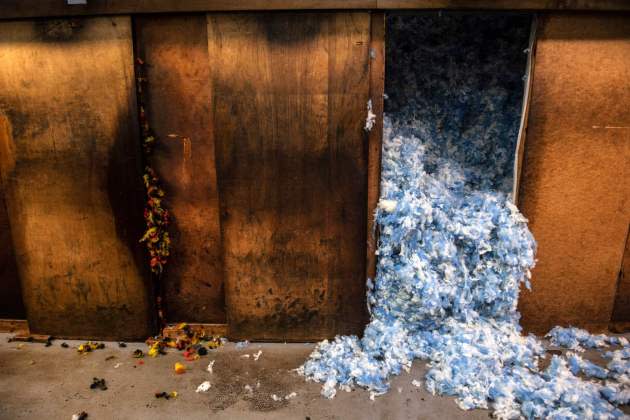Pangaia, Tesco Partner With $5 Million UKFT Textile Recycling Project

Over one million tons—two billion pounds—of used textiles are generated in the UK each year, with estimates showing that a third of them end up in landfills, incinerated or exported to lower-cost labor regions.
To combat this, the UK Fashion and Textile Association (UKFT) is leading a 4-million-pound (about $5 million) project to develop and pilot a “pioneering” fully-integrated, automated sorting and pre-processing demonstrator for waste (ATSP), which the organization predicts could eventually divert thousands of tons from landfills annually.
More from Sourcing Journal
The project—the Autosort for Circular Textiles Demonstrator (ACT UK)—is a two-year plan to support the transition from “uneconomic” manual sorting of clothes and textiles that aren’t suitable for resale (also known as non-rewearable textiles, or NRT) to highly automated sorting and pre-processing. That can then be used as feedstock for existing and emerging recycling processes. It will bring together and advance critical technological components, like optical scanning, robotics, AI pre-processing and size reduction equipment, all “under one roof” in hopes of creating a “blueprint” that integrates the latest technologies to be deployed throughout the UK.
Manual sorting of textiles has limitations, the UKFT said, as it’s not currently possible to sort garments by fiber composition “by eye.” Plus, pre-processing, which includes removing buttons, zippers and trims, required by textile recyclers hasn’t been optimized or customized to fit their unique needs; no scaled process currently exists to bring all of these individual pieces into one industrial process facility.
“What happens to our textiles when we no longer need them is a growing problem that we cannot ignore,” Adam Mansell, CEO of UKFT, said. “With this ground-breaking project, we’re aiming to create a model to sort and prepare NRT for recycling in a way that’s never been done before, at scale.”
ACT UK is building on sorting approaches that are coming to market in countries including the Netherlands—where regulations state that textile producers are responsible for what happens to their products after use—as well Sweden, home of Renewcell, and Spain, which recently saw apparel leaders like Inditex, H&M and Mango partner to form the Association for Textile Trash Management. The UK’s approach aims to innovate by combining and advancing existing technologies, while supporting emerging ones, to overcome the current barriers to material circularity.
ACT UK is bringing together a consortium of recycling technologies, textile collectors and sorters, academia, manufacturer, industry associations, technologists, brands and retailers, supported via funding from Innovate UK, the United Kingdom’s innovation agency that provides money and help to organizations to grow through the development and commercialization of new products, processes and services; the Arts and Humanities Research Council (AHRC), a British research council funding supporting arts and humanities research and study in the UK; and the Natural Environment Research Council (NERC), a UK research council that supports research, training and knowledge transfer activities in the environmental sciences. All organizations are part of UK Research and Innovation (UKRI), a non-departmental public body of government in the UK that directs research and innovation funding.
Project partners include IBM, Marks & Spencer, Tesco, Pangaia, New Look, Reskinned, Salvation Army, Oxfam, Textile Recycling International, Shred Station, Worn Again Technologies, English Fine Cottons, Alex Begg, Camira, Manufacturing Technology Centre, University of Leeds, University of Huddersfield, Textile Recycling Association and WRAP, with more partners expected to join the consortium.
“A national system of recycling plants could save 100,000s of tons of material from entering landfill,” Mansell said. “In turn, the system could generate huge volumes of material for use across the UK textile manufacturing sector.”
This project is connected to other initiatives done by UKFT, such as the Circular Fashion Innovation Network, which is part of the Institute for Positive Fashion, in partnership with the British Fashion Council (BFC) and that’s also part of the UKRI Circular Fashion Programme, which will support and guide the creation of a circular fashion ecosystem in the UK. The UKFT is also involved in the sandbox development of an industry-led extended producer responsibility (EPR) scheme for textiles as well as the Digital Supply Chain Hub for Textiles that will improve the visibility of data flows in waste textiles—critical to understanding flows of textiles through the ATSP.
Solve the daily Crossword

